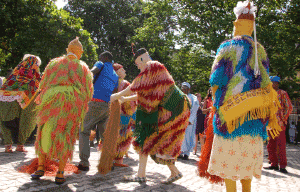Nigeria is blessed with countless festivals that have the potential to draw tourists to no limit; but that is yet to happen. Assistant Life Editor, TERH AGBEDEH, examines this potential against the backdrop of the very successful 35th DIFF held recently in South Africa…
Maquerades at the last Black Heritage Festival in Lagos
Most cities around the world are known for a particular event, which tourists mark their calendar by. It does not matter if the city has bad press, people want to be there at that time of the year to experience the magic that event portends. It could be a festival, art expo or carnival; but as long as it has built a reputation of good organisation for itself and thereby holding every year, multitudes come. This often translates to revenue for the city concerned, since those who come will definitely spend money.
In Lagos
Indeed, the Commissioner for Tourism and Intergovernmental Relations in Lagos State, Oladisun Holloway, said one of the reasons the state holds festivals is because of the economic value. He made the statement at the opening ceremony for the Lagos Theatre Festival organised by the British Council Nigeria late last year at Freedom Park in Lagos.
“The Lagos Carnival employs close to 3,000 artisans. These are persons who ordinarily do not have what they do during the year,” he had explained.
Lagos’ effort in the support of festivals and destination creation cannot be overemphasised. It is the reason many more of the festivals hold in the state, and places like Freedom Park and the Lagos Conservation Centre (the latter has one of the longest walkways in the world) continue to draw tourists from within and outside the state.
Festivals that take place in Lagos are the MUSON Jazz Festival, Lagos Art and Book Festival (LABAF), the iRepresent International Documentary Film Festival (iREP), Badagry Festival, Lagos Black Heritage Festival and a host of others. But one common thread that runs through these festivals is the limited or utter lack of sponsorship.
In South Africa
Unlike in the case of the Durban International Film Festival (DIFF), which has a lot of support from the government of South Africa, this is not the case here. For instance, this year, support came from the National Film and Video Foundation (NFVF), KwaZulu-Natal Department of Economic Development and Tourism, KwaZulu-Natal Film Commission, City of Durban, German Embassy, Goethe-Institut, Industrial Development Corporation, KwaZulu-Natal Department of Arts and Culture, and the Gauteng Film Commission, among others.
Sure of such sponsorship, the DIFF organisers started planning the festival early, with most of the expected guests notified three months before with their itineraries, hotel bookings and air tickets attached to their e-mails.
Nigerian factor
This is not the case, even for a film festival endowed by a ministry of the Federal Government in Nigeria. There have been cases where a festival is delayed or utterly cancelled because it was not captured in the budget for that year.
Getting sponsorship for festivals from corporate Nigeria has also been a difficult task, and the LABAF, which has been on for close to two decades, is not exempted.
Secretary General of the Committee for Relevant Art (CORA), Toyin Akinosho, which organises LABAF, lamented this reality in a recent interview.
The publisher of Africa Oil & Gas Report, however, said that there was no use dwelling on the fundamental problem with funding the arts in Nigeria, because “if we keep on doing this and it grows bigger, people will sit down and take notice”.
Chief Executive Officer of Inspiro Productions, Ayoola Sadare, who produces the Lagos International Jazz Festival, rather said it was because festivals or art events were a work in progress in Nigeria.
For you to promote the arts here, he said, you must love the arts; it’s like a calling.
“Over there, they have grants and foundations. It is true that the corporate world does not seem to love the arts in the country, but there is also a problem with the packaging,” he stated.
For him, there is a renaissance taking place in the arts, much like what happened to other sectors like banking and insurance that have revolutionised.
According to him, he explained that 15 or 20 years ago, one had to queue in a bank for a whole day; but that has changed, and that is possible in the arts.
“The time would come for the arts industry where people would see the potential and the seriousness of it. The onus is on a few people to be able to package what we do in the art into a language that potential sponsors can understand,” he stated.
Last line
Often, as is the case with the DIFF, such festivals have sponsorship from the government. But as it was clear to see in Durban, sponsorship alone is not enough; there must also be good planning on the part of organisers. Everything the DIFF organisers said they would do, they did. The hotel rooms were ready when the guests arrived. There were shuttle buses throughout the duration of the festival, and when there were hiccups, there was always someone on hand to fix things. In other words, everything was taken into consideration and the guests were never left to their own devices.
Those who have attended some festivals in Nigeria would attest to the fact that this is often not the case. Some Nigerian organisers fail in simple thing as replying an e-mail sent by an intending participant. Some would even book guests into a hotel they have never been to.
One other thing that is key is the improvement of infrastructure in the cities where such festivals are held. Because DIFF and the city of Durban work, there was an easy synergy, and everyone who came would like to go back and see the city.
Durban certainly has an underbelly, but there was a deliberate effort on the part of the organisers to make sure the guests saw the best of the city. For instance, guests were lodged at some of the best hotels the city has to offer and mollycoddled in the best entertainment centres. This also served the purpose of marketing the city. If government and organisers of festivals in Nigeria want to go places, they have no choice than to borrow a leaf from an event like the DIFF.













